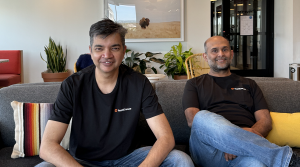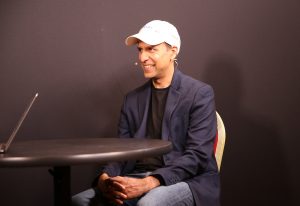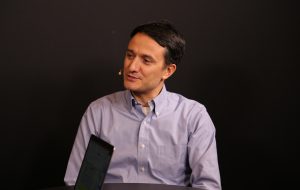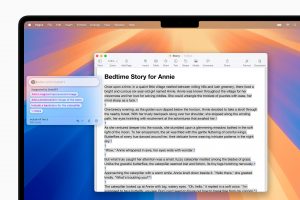Hadoop left MapReduce behind years ago| #HPBigData2014
![]() HP Vertica is all about transformative technologies, new use applications, the evolution of its platform, signaling changes including a decline in relevance for MapReduce in the Big Data marketplace, said Colin Mahoney, General Manager of HP Vertica, in conversation with John Furrier and Dave Vellante on the first day of the HP Vertica conference in Boston, Massachusetts. The focus on customers and learning, Mahoney said, is not limited to the little guy. “Even high production customers are at the conference to learn,” said Mahoney about the event and Vertica’s ongoing goals.
HP Vertica is all about transformative technologies, new use applications, the evolution of its platform, signaling changes including a decline in relevance for MapReduce in the Big Data marketplace, said Colin Mahoney, General Manager of HP Vertica, in conversation with John Furrier and Dave Vellante on the first day of the HP Vertica conference in Boston, Massachusetts. The focus on customers and learning, Mahoney said, is not limited to the little guy. “Even high production customers are at the conference to learn,” said Mahoney about the event and Vertica’s ongoing goals.
Embracing change without throwing out the column store
When Vertica debuted in 2007, Vellante pointed out, it was essentially a feature company — a column store. Today, the platform is very different, though “people still buy on that feature.”
Mahoney commented that a lot of the workloads that customers have — “a lot of the machine learning, a lot of the clickstream analytics, a lot of the things that are beyond just the type of product that’s underlying, everyone has that need. And so we’ve certainly broadened.”
While the columnar format was Vertica’s original flagship, Vertica has always operated under the premise that “one size does not fit all.”
“We knew,” Mahoney continued, “that if we created the right foundation, the right architecture, if we built it from the ground up, we could then add on the right capabilities.” Mahoney compared Vertica’s technology to their competitors, which he described as “taking decades old technology that was never designed for the workloads that we have today.” While those technologies have a lot of functionality, he said, their weaknesses lie in economical scale and performance — aspects of that came first at the Vertica platform.
Read more after the video:
“MapReduce is pretty much dead”
Citing the recent Wikibon Big Data Survey in which 90 percent of respondents said they were moving resources away from traditional EDW and putting them towards Hadoop, Vellante asked Mahoney how Vertica will “preserve and expand their total available market,” since they were “not traditional EDW and not pure play Hadoop.”
Mahoney started by saying that the early days of Hadoop were all about MapReduce, but “MapReduce is pretty much dead, it’s gone. Now,” he said, Hadoop is “focused on YARN, they’re focused on workload management. They’re forced on databases. They’re focused on SQL.”
Hadoop, according to Mahoney, has expanded in convergence with Vertica, “which is why it’s always been a part of our HAVEn platform.” HAVEn is HP’s Big Data platform that combines several businesses under the HP umbrella, including Autonomy and Vertica. Regardless of the current trends, though, Mahoney stressed that Vertica has always been focused on “what the customer is trying to do.” Once customers needs are understood, he said, Vertica can take customers down the right path, even if it’s patch worked with a variety of technologies.
Furrier jumped in to delve deeper into Mahoney’s statement that “MapReduce is dead.” Mahoney explained that he thinks the reason the industry is moving away from MapReduce is the amount of complex knowledge it requires to operate: “There is such a shortage of people that know how to interact with data…Not many of us are able to do the programming.”
Other technologies like SQL are “a more common construct where you can use a declarative language to get at the data.” That ease-of-use, Mahoney said, has encouraged the Hadoop community to shift towards Hive and other SQL based solutions, away from MapReduce and the “traditional enterprise data warehouse.” People want “instant access to be able to monetize,” not “one monolithic platform that takes months and months to load and process data.”
Embedding “data smarts” to drive value
Vellante also asked Mahoney about some of his previous statements regarding “Analytics 3.0” and the way manufacturers now have the opportunity to “embed data smarts” into their products.
Mahoney expanded on his statement, relating it to the Internet of Things. Since products and services are now designed to collect data as they’re used, manufactures have to reconsider how to put that feedback to good use. The value, Mahoney stressed, is all in the data, regardless of the platform on which that data exists. “What folks want,” he said, “is the tangible patterns and value” they can extract from the data and act upon.
Machine learning automates insights
Next, Vallente touched on a statistic that Mahoney shared in his keynote address at the conference: “For every two orders of magnitude increase in the amount of data, there’s essentially four orders of magnitude in terms of the patterns you can analyze.”
“What,” Vellante asked, “is HP Vertica doing to close that gap?” Mahoney replied that a lot of what his company focuses on is how to ensure that users don’t need a PhD in order to derive value from data. He mentioned machine learning, in particular, as an aspect of HP Vertica that provides massive value because it augments and automates the derivation of insights from data, meaning that practitioners can be more productive because they have more time.
HP Vertica: A freight truck that handles like a Ferrari
To conclude their interview, Furrier asked Mahoney to comment on the characterization of Vertica as the “Ferrari of Big Data because of its performance.” With a smile, Mahoney said, “It’s a Ferrari, it’s very, very fast, but it’s more than speed […] so much of our value is about the functionality. It’s about the analytics you can do on the information.”
Continuing the metaphor, Furrier wondered, “Do you ever worry that people don’t know how to drive the Ferrari?” Answering yes, Mahoney added, “I’m not sure people have ever encountered — in the same context — an ‘automobile’ quite like this. More than a Ferrari,” Mahoney quipped, “this is a massive freight truck that happens to handle as fast as a Ferrari.”
photo credit: Éole via photopin cc
A message from John Furrier, co-founder of SiliconANGLE:
Your vote of support is important to us and it helps us keep the content FREE.
One click below supports our mission to provide free, deep, and relevant content.
Join our community on YouTube
Join the community that includes more than 15,000 #CubeAlumni experts, including Amazon.com CEO Andy Jassy, Dell Technologies founder and CEO Michael Dell, Intel CEO Pat Gelsinger, and many more luminaries and experts.
THANK YOU









